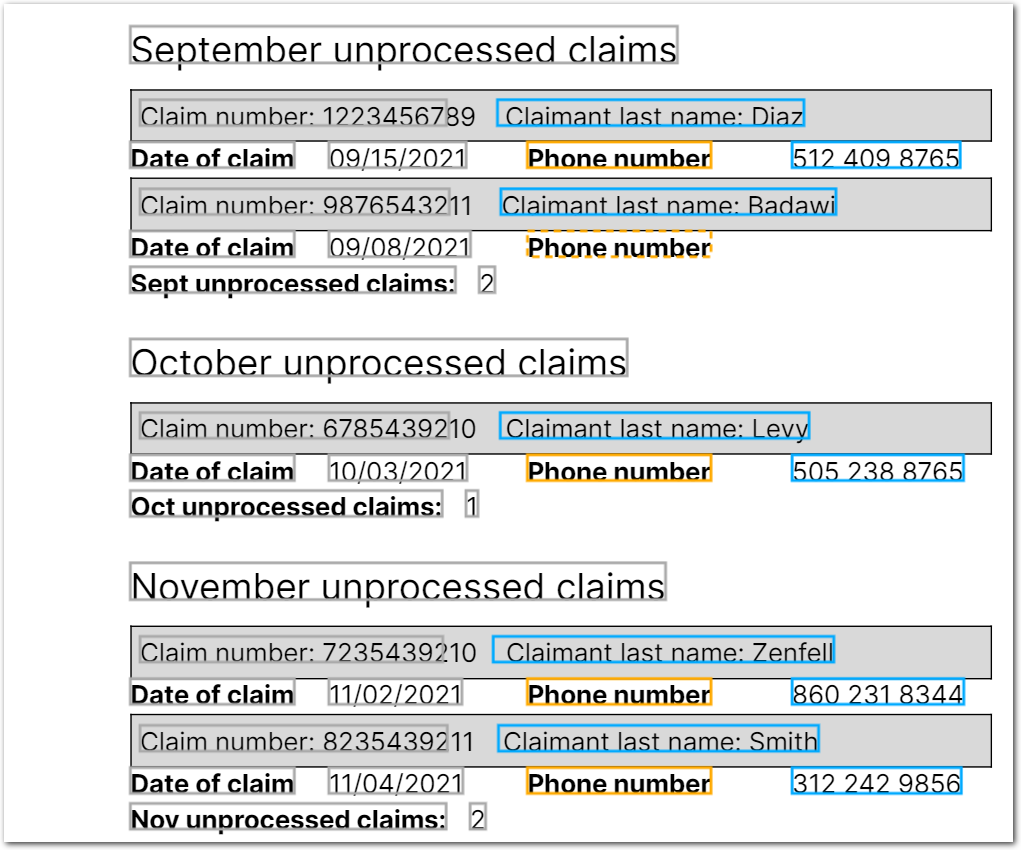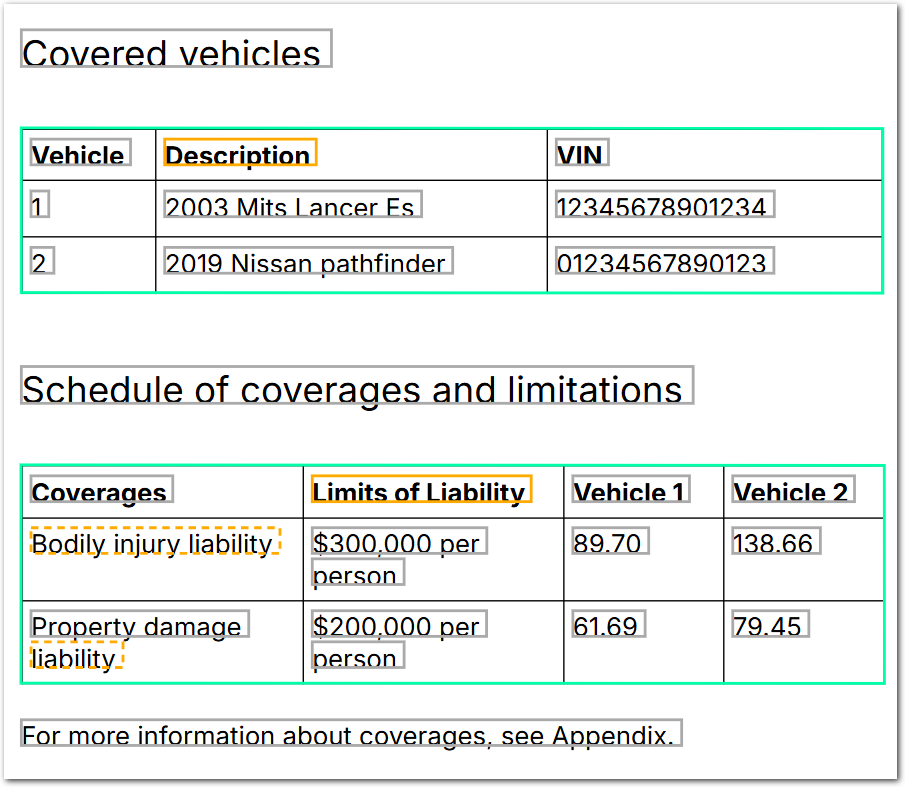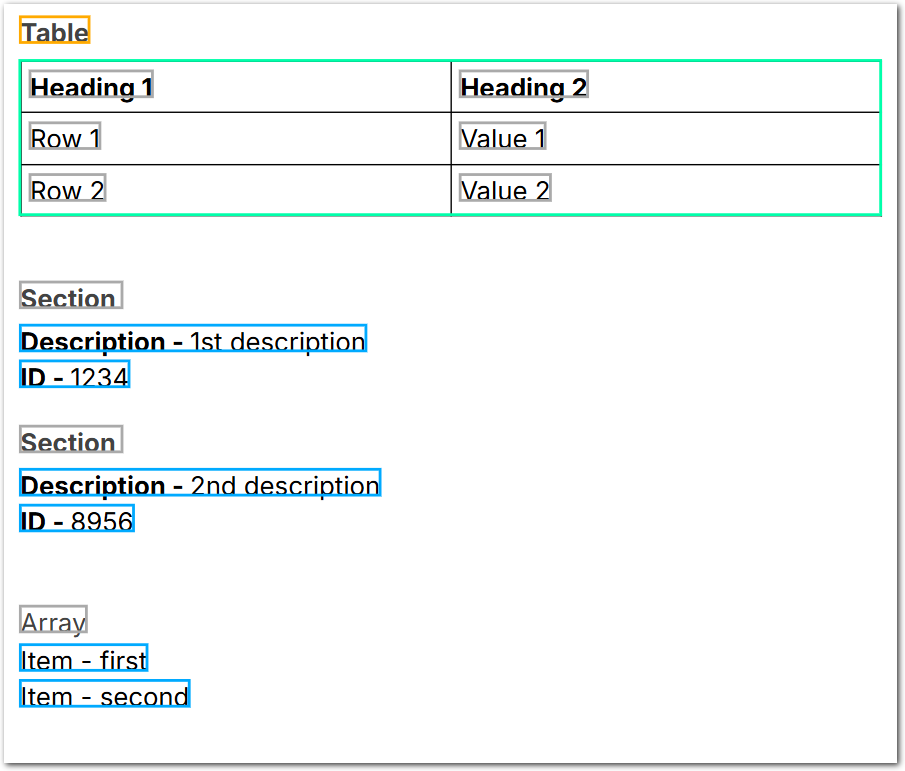Zip
Zips tables into rows, or zips tables, arrays, and sections.
Parameters
The following parameters are in the computed field's global Method parameter:
| key | value | description |
|---|---|---|
| id (required) | zip | This method returns a section group. For more information, see notes in succeeding table. |
| source_ids (required) | array of field IDs in the current config | The id of the fields to zip. You can use a JavaScript-flavored regular expression to specify all field IDs that contain a pattern. For example, to specify all the field IDs containing the text wage extracted from a W-2 form, you can write "source_ids": { "pattern": ".*wage.*" }. For more information and an example, see Example: Chain prompts with regex. |
See the following table for information about the Zip method's output:
| source ids | output | notes |
|---|---|---|
| arrays | section group containing zipped arrays | For each element in each array, Sensible adds the element identified by the field ID to a section. As an example with simplified syntax,"product_color":["blue", "red"] and "product_id": [123, 456] zip to "zipped_products":[ {"product_color": "blue", "product_id": 123}, {"product_color": "red", "product_id": 456} ]. Examples of source fields that output arrays include those with "match": "allWithNull" or "type": "name" configured. If the source arrays are of different lengths, Sensible appends null values for the shorter of the two arrays in the zipped output, up to the length of the longer array. Avoid using "match":"all" with the Zip computed field method. This option strips out null array elements and can result in source arrays of unpredictably different lengths.For a full example, see Example 1. |
| one table | section group containing rows | Sensible zips the columns in a table into row objects. As an example with simplified syntax: {"source_table":{"columns":[{"id":"car_model","values":["Camry","CR-V"]},{"id":"car_year","values":[2010,2015]}]}} zips to: {"zipped_table":[{"car_model":"Camry","car_year":2010},{"car_model":"CR-V","car_year":2015}]}For information about how Sensible handles fields that return table arrays, see the Notes section. For a full example, see Example 2. |
| tables | section group containing merged rows | For an example, see Example 3. For information about how Sensible handles fields that return table arrays, see the Notes section. |
| section groups | section group containing merged sections | For an example, see Zip sections example. |
| mixed input: tables, section groups, and arrays | section group containing merged rows, sections, and array items | For an example, see Example 4. For information about how Sensible handles fields that return table arrays, see the Notes section. |
Examples
Example 1: All With Null zip
The following example shows using "match":"allWithNull" as an alternative to sections to return parallel arrays of phones and last names.
Note: Avoid using "match":"all" with the Zip computed field method. This option strips out null array elements and can result in source arrays of unpredictably different lengths.
Config
{
"preprocessors": [
{
"type": "splitLines",
"minSpaces": 3
}
],
"fields": [
{
/* using `allWithNull` outputs a 5-element array
with one null element (phone for Badawi).
This is preferable to using `all`, which would strip
out a null and output a 4-element array, resulting in
erroneous phone and name pairs
starting with the array element "Badawi */
"id": "phone_number",
"match": "allWithNull",
"anchor": {
"match": {
"type": "startsWith",
"text": "phone number"
}
},
"method": {
"id": "row"
}
},
{
"id": "last_name",
"match": "allWithNull",
"anchor": {
"match": {
"type": "startsWith",
"text": "claimant last name"
}
},
"method": {
"id": "label",
"position": "right"
}
}
],
"computed_fields": [
{
"id": "name_and_phone",
"method": {
"id": "zip",
"source_ids": [
"phone_number",
"last_name"
]
}
},
{
"id": "hide_unzipped_fields",
"method": {
"id": "suppressOutput",
"source_ids": [
"phone_number",
"last_name"
]
}
}
]
}Example document
The following image shows the example document used with this example config:

| Example document | Download link |
|---|
Output
{
"name_and_phone": [
{
"phone_number": {
"type": "string",
"value": "512 409 8765"
},
"last_name": {
"type": "string",
"value": ": Diaz"
}
},
{
"phone_number": null,
"last_name": {
"type": "string",
"value": ": Badawi"
}
},
{
"phone_number": {
"type": "string",
"value": "505 238 8765"
},
"last_name": {
"type": "string",
"value": ": Levy"
}
},
{
"phone_number": {
"type": "string",
"value": "860 231 8344"
},
"last_name": {
"type": "string",
"value": ": Zenfell"
}
},
{
"phone_number": {
"type": "string",
"value": "312 242 9856"
},
"last_name": {
"type": "string",
"value": ": Smith"
}
}
]
}Example 2: Zip table
The following example shows using the Zip method to transform each row from a table of vehicles into a vehicle object.
Notes:
-
In order to filter out all column headings, the config specifies
"type": "number"and"isRequired": truefor the columncol3_year_made. -
To improve performance, the config specifies a Stop parameter. This ensures Sensible restricts table recognition to the relevant page area.
Config
{
"fields": [
{
"id": "_insured_vehicles_table",
"anchor": "insured vehicles",
"type": "table",
"method": {
"id": "fixedTable",
"columnCount": 4,
"columns": [
{
"id": "col2_model",
"index": 1
},
{
"id": "col3_year_made",
"index": 2,
"type": "number",
"isRequired": true
}
],
"stop": {
"type": "startsWith",
"text": "please"
}
}
}
],
"computed_fields": [
{
"id": "computed_insured_vehicles",
"method": {
"id": "zip",
"source_ids": [
"_insured_vehicles_table"
]
}
}
]
}Example document
The following image shows the example document used with this example config:

| Example document | Download link |
|---|
Output
{
"_insured_vehicles_table": {
"columns": [
{
"id": "col2_model",
"values": [
{
"value": "Camry",
"type": "string"
},
{
"value": "CR-V",
"type": "string"
},
{
"value": "Golf",
"type": "string"
}
]
},
{
"id": "col3_year_made",
"values": [
{
"source": "2010",
"value": 2010,
"type": "number"
},
{
"source": "2015",
"value": 2015,
"type": "number"
},
{
"source": "2020",
"value": 2020,
"type": "number"
}
]
}
],
"title": {
"type": "string",
"value": "Insured vehicles"
},
"footer": {
"type": "string",
"value": "Please see your policy documents for details."
}
},
"computed_insured_vehicles": [
{
"col2_model": {
"value": "Camry",
"type": "string"
},
"col3_year_made": {
"source": "2010",
"value": 2010,
"type": "number"
}
},
{
"col2_model": {
"value": "CR-V",
"type": "string"
},
"col3_year_made": {
"source": "2015",
"value": 2015,
"type": "number"
}
},
{
"col2_model": {
"value": "Golf",
"type": "string"
},
"col3_year_made": {
"source": "2020",
"value": 2020,
"type": "number"
}
}
]
}Example 3: Zip tables
Config
{
"fields": [
{
"id": "table_1",
"anchor": "description",
"method": {
"id": "fixedTable",
"columnCount": 3,
"startOnRow": 1,
"columns": [
{
"id": "vehicle_num",
"index": 0
},
{
"id": "description",
"index": 1
},
],
"stop": "schedule"
}
},
{
"id": "table_2",
"anchor": "liability",
"method": {
"id": "fixedTable",
"columnCount": 4,
"startOnRow": 1,
"columns": [
{
"id": "coverage",
"index": 0
},
{
"id": "vehicle_1",
"index": 2
},
{
"id": "vehicle_2",
"index": 3
},
],
"stop": "see"
}
},
{
"id": "zip",
"method": {
"id": "zip",
"source_ids": [
"table_1",
"table_2"
]
}
}
]
}Example document
The following image shows the example document used with this example config:

| Example document | Download link |
|---|
Output
{
"table_1": {
"columns": [
{
"id": "vehicle_num",
"values": [
{
"value": "1",
"type": "string"
},
{
"value": "2",
"type": "string"
}
]
},
{
"id": "description",
"values": [
{
"value": "2003 Mits Lancer Es",
"type": "string"
},
{
"value": "2019 Nissan pathfinder",
"type": "string"
}
]
}
],
"title": {
"type": "string",
"value": "Covered vehicles"
}
},
"table_2": {
"columns": [
{
"id": "coverage",
"values": [
{
"value": "Bodily injury liability",
"type": "string"
},
{
"value": "Property damage liability",
"type": "string"
}
]
},
{
"id": "vehicle_1",
"values": [
{
"value": "89.70",
"type": "string"
},
{
"value": "61.69",
"type": "string"
}
]
},
{
"id": "vehicle_2",
"values": [
{
"value": "138.66",
"type": "string"
},
{
"value": "79.45",
"type": "string"
}
]
}
],
"title": {
"type": "string",
"value": "Schedule of coverages and limitations"
},
"footer": {
"type": "string",
"value": "For more information about coverages, see Appendix."
}
},
"zip": [
{
"vehicle_num": {
"value": "1",
"type": "string"
},
"description": {
"value": "2003 Mits Lancer Es",
"type": "string"
},
"coverage": {
"value": "Bodily injury liability",
"type": "string"
},
"vehicle_1": {
"value": "89.70",
"type": "string"
},
"vehicle_2": {
"value": "138.66",
"type": "string"
}
},
{
"vehicle_num": {
"value": "2",
"type": "string"
},
"description": {
"value": "2019 Nissan pathfinder",
"type": "string"
},
"coverage": {
"value": "Property damage liability",
"type": "string"
},
"vehicle_1": {
"value": "61.69",
"type": "string"
},
"vehicle_2": {
"value": "79.45",
"type": "string"
}
}
]
}Example 4: Mixed zip
The following example demonstrates zipping sections, tables, and arrays.
Config
{
"fields": [
{
"id": "table",
"anchor": "table",
"method": {
"id": "fixedTable",
"columnCount": 2,
"columns": [
{
"id": "col_1",
"index": 0
},
{
"id": "col_2",
"index": 1
},
]
}
},
{
"id": "sections",
"type": "sections",
"range": {
"anchor": "section",
},
"fields": [
{
"id": "description",
"anchor": "description",
"method": {
"id": "passthrough"
}
},
{
"id": "ID",
"anchor": "ID",
"method": {
"id": "passthrough"
}
},
]
},
{
"id": "array",
"anchor": "item",
"match": "all",
"method": {
"id": "passthrough"
}
},
{
"id": "zip",
"method": {
"id": "zip",
"source_ids": [
/* zip represents table as rows, not columns */
"table",
/* join each row with 1 section ... */
"sections",
/* ... and with 1 array item */
"array"
]
}
}
]
}Example document
The following image shows the example document used with this example config:

| Example document | Download link |
|---|
Output
{
"table": {
"columns": [
{
"id": "col_1",
"values": [
{
"value": "Heading 1",
"type": "string"
},
{
"value": "Row 1",
"type": "string"
},
{
"value": "Row 2",
"type": "string"
}
]
},
{
"id": "col_2",
"values": [
{
"value": "Heading 2",
"type": "string"
},
{
"value": "Value 1",
"type": "string"
},
{
"value": "Value 2",
"type": "string"
}
]
}
]
},
"sections": [
{
"description": {
"type": "string",
"value": "Description - 1st description"
},
"ID": {
"type": "string",
"value": "ID - 1234"
}
},
{
"description": {
"type": "string",
"value": "Description - 2nd description"
},
"ID": {
"type": "string",
"value": "ID - 8956"
}
}
],
"array": [
{
"type": "string",
"value": "Item - first"
},
{
"type": "string",
"value": "Item - second"
}
],
"zip": [
{
"col_1": {
"value": "Heading 1",
"type": "string"
},
"col_2": {
"value": "Heading 2",
"type": "string"
},
"description": {
"type": "string",
"value": "Description - 1st description"
},
"ID": {
"type": "string",
"value": "ID - 1234"
},
"array": {
"type": "string",
"value": "Item - first"
}
},
{
"col_1": {
"value": "Row 1",
"type": "string"
},
"col_2": {
"value": "Value 1",
"type": "string"
},
"description": {
"type": "string",
"value": "Description - 2nd description"
},
"ID": {
"type": "string",
"value": "ID - 8956"
},
"array": {
"type": "string",
"value": "Item - second"
}
},
{
"col_1": {
"value": "Row 2",
"type": "string"
},
"col_2": {
"value": "Value 2",
"type": "string"
}
}
]
}Notes
-
If a single source field ID outputs an array of tables, then for backward compatibility Sensible discards all other source fields, and returns an array of sections groups, each containing a zipped table. For example, if you configure
"source_ids": ["table_1", "table_2", "table_array", "section_1"], where"table_array"is configured with"match":"all", then Sensible discards all source fields except"table_array". -
If there are duplicate field keys when merging, the last-listed key in the
source_fieldsarray overwrites any preceding ones. The following is an example of source fields with simplified syntax:
"item_color": [ {"color": "blue", "ID": 123}, {"color": "red", "ID": 456}, ... ],
"item_size": [ {"size": "x-large", "ID": 789}, {"size": "small", "ID": 456}, ... ]If you zip with "source_ids": ["item_color", "item_size"], then the first merged item is [ {color: "blue", "ID": 789, "size": "x-large"}, ... ].
If you zip with "source_ids": ["item_size", "item_color"], then the first merged item is [ {"color": "blue", "ID": 123, "size": "x-large"}, ... ].
Updated 2 months ago